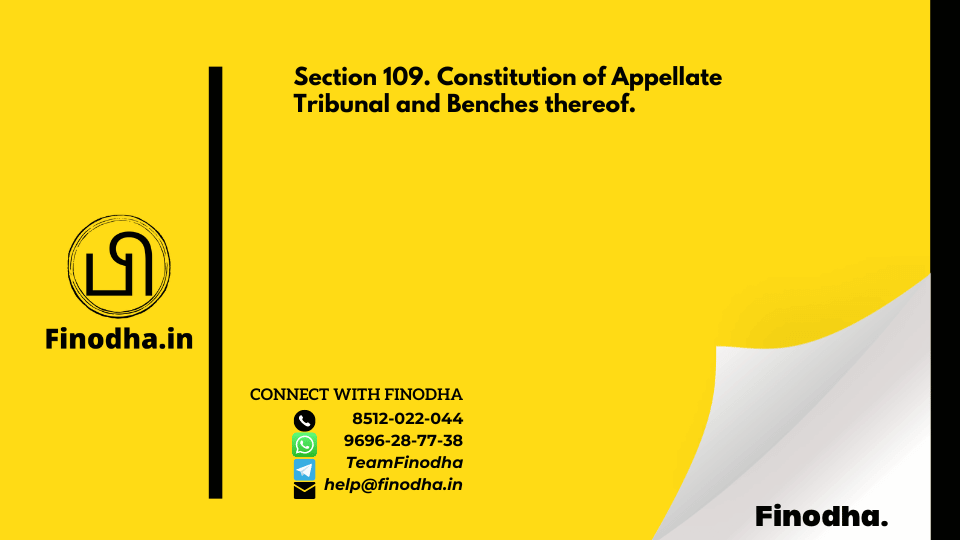
by Shakshi Bharti | Sep 6, 2024 | GST, Acts, Central Goods and Services Tax Act, 2017
Important Keyword: GST, CGST, SGST, IGST, Section 107, Section 108, Section 112.
GST Section 112. Appeals to Appellate Tribunal.-
(1) Any person aggrieved by an order passed against him under section 107 or section 108 of this Act or the State Goods and Services Tax Act or the Union Territory Goods and Services Tax Act may appeal to the Appellate Tribunal against such order within 1three months from the date on which the order sought to be appealed against is communicated to the person preferring the appeal 4[; or the date, as may be notified by the Government, on the recommendations of the Council, for filing appeal before the Appellate Tribunal under this Act, whichever is later.].
(2) The Appellate Tribunal may, in its discretion, refuse to admit any such appeal where the tax or input tax credit involved or the difference in tax or input tax credit involved or the amount of fine, fee or penalty determined by such order, does not exceed fifty thousand rupees.
(3) The Commissioner may, on his own motion, or upon request from the Commissioner of State tax or Commissioner of Union territory tax, call for and examine the record of any order passed by the Appellate Authority or the Revisional Authority under this Act or the State Goods and Services Tax Act or the Union Territory Goods and Services Tax Act for the purpose of satisfying himself as to the legality or propriety of the said order and may,
by order, direct any officer subordinate to him to apply to the Appellate Tribunal within 2six months from the date on which the said order has been passed 4[; or the date, as may be notified by the Government, on the recommendations of the Council, for the purpose of filing application before the Appellate Tribunal under this Act, whichever is later,] for determination of such points arising out of the said order as may be specified by the Commissioner in his order.
(4) Where in pursuance of an order under sub-section (3) the authorised officer makes an application to the Appellate Tribunal, such application shall be dealt with by the Appellate Tribunal as if it were an appeal made against the order under sub-section (11) of section 107 or under sub-section (1) of section 108 and the provisions of this Act shall apply to such application, as they apply in relation to appeals filed under sub-section (1).
(5) On receipt of notice that an appeal has been preferred under this section, the party against whom the appeal has been preferred may, notwithstanding that he may not have appealed against such order or any part thereof, file, within forty-five days of the receipt of notice, a memorandum of cross-objections, verified in the prescribed manner, against any part of the order appealed against and such memorandum shall be disposed of by the Appellate Tribunal, as if it were an appeal presented within the time specified in sub-section (1).
(6) The Appellate Tribunal may admit an appeal within three months after the expiry of the period referred to in sub-section (1) 4[or permit the filing of an application within three months after the expiry of the period referred to in sub-section (3)], or permit the filing of a memorandum of cross-objections within forty-five days after the expiry of the period referred to in sub-section (5) if it is satisfied that there was sufficient cause for not presenting it within that period.
(7) An appeal to the Appellate Tribunal shall be in such form, verified in such manner and shall be accompanied by such fee, as may be prescribed.
(8) No appeal shall be filed under sub-section (1), unless the appellant has paid-
(a) in full, such part of the amount of tax, interest, fine, fee and penalty arising from the impugned order, as is admitted by him, and
(b) a sum equal to 5[ten per cent.] of the remaining amount of tax in dispute, in addition to the amount paid under sub-section (6) of section 107, arising from the said order, 3[subject to a maximum of 5[twenty crore rupees]] , in relation to which the appeal has been filed.
(9) Where the appellant has paid the amount as per sub-section (8), the recovery proceedings for the balance amount shall be deemed to be stayed till the disposal of the appeal.
(10) Every application made before the Appellate Tribunal,-
(a) in an appeal for rectification of error or for any other purpose; or
(b) for restoration of an appeal or an application, shall be accompanied by such fees as may be prescribed.
*Enforced w.e.f. 1st July, 2017.
1. The start of “three months period” under section 112(1) of CGST Act, 2017, shall be considered to be the later of the following dates:-
(i) date of communication of order; or
(ii) the date on which the President or the State President, as the case may be, of the Appellate Tribunal after its constitution under section 109, enters office.
– Vide CGST (Ninth Removal of Difficulties) Order, 2019 issued under C.B.I. & C. Order No. 9/2019-C.T., dated 3.12.2019.
2. The start of “six months period” under section 112(3) of the CGST Act, 2017 shall be considered to be the later of the following dates:-
(i) date of communication of order; or
(ii) the date on which the President or the State President, as the case may be, of the Appellate Tribunal after its constitution under section 109, enters office.
– Vide CGST (Ninth Removal of Difficulties) Order, 2019 issued under C.B.I. & C. Order No. 9/2019-C.T., dated 3.12.2019.
3. Inserted (w.e.f. 1.2.2019) by s. 26 of the CGST (Amendment) Act, 2018 (31 of 2018).
4. Inserted (w.e.f. 01.08.2024) by section 143 of The Finance Act (No. 2) Act, 2024 No. 15 of 2024 dated 16.08.2024.
5. Substituted by section 143 of The Finance Act (No. 2) Act, 2024 No. 15 of 2024 dated 16.08.2024.
Read More: Notification No. 29/2018 – Central Tax (Rate): Seeks to amend notification No. 13/2017- Central Tax (Rate) so as to specify services to be taxed under Reverse Charge Mechanism (RCM) as recommended by Goods and Services Tax Council in its 31st meeting held on 22.12.2018.
Web Stories: Notification No. 29/2018 – Central Tax (Rate): Seeks to amend notification No. 13/2017- Central Tax (Rate) so as to specify services to be taxed under Reverse Charge Mechanism (RCM) as recommended by Goods and Services Tax Council in its 31st meeting held on 22.12.2018.
Download Pdf: https://taxinformation.cbic.gov.in/

by Shakshi Bharti | Sep 6, 2024 | GST, Acts, Central Goods and Services Tax Act, 2017
Important Keyword: GST, CGST, SGST, IGST, Section 111, Section 124, Section 123.
GST Section 111. Procedure before Appellate Tribunal.-
(1) The Appellate Tribunal shall not, while disposing of any proceedings before it or an appeal before it, be bound by the procedure laid down in the Code of Civil Procedure, 1908, but shall be guided by the principles of natural justice and subject to the other provisions of this Act and the rules made thereunder, the Appellate Tribunal shall have power to regulate its own procedure.
(2) The Appellate Tribunal shall, for the purposes of discharging its functions under this Act, have the same powers as are vested in a civil court under the Code of Civil Procedure, 1908 while trying a suit in respect of the following matters, namely:-
(a) summoning and enforcing the attendance of any person and examining him on oath;
(b) requiring the discovery and production of documents;
(c) receiving evidence on affidavits;
(d) subject to the provisions of sections 123 and 124 of the Indian Evidence Act, 1872 (1 of 1872), requisitioning any public record or document or a copy of such record or document from any office;
(e) issuing commissions for the examination of witnesses or documents;
(f) dismissing a representation for default or deciding it ex parte;
(g) setting aside any order of dismissal of any representation for default or any order passed by it ex parte; and
(h) any other matter which may be prescribed.
(3) Any order made by the Appellate Tribunal may be enforced by it in the same manner as if it were a decree made by a court in a suit pending therein, and it shall be lawful for the Appellate Tribunal to send for execution of its orders to the court within the local limits of whose jurisdiction,-
(a) in the case of an order against a company, the registered office of the company is situated; or
(b) in the case of an order against any other person, the person concerned voluntarily resides or carries on business or personally works for gain.
(4) All proceedings before the Appellate Tribunal shall be deemed to be judicial proceedings within the meaning of sections 193 and 228, and for the purposes of section 196 of the Indian Penal Code, and the Appellate Tribunal shall be deemed to be civil court for the purposes of section 195 and Chapter XXVI of the Code of Criminal Procedure, 1973.
*Enforced w.e.f . 1st July, 2017.
Read More: Notification No. 29/2018 – Central Tax (Rate): Seeks to amend notification No. 13/2017- Central Tax (Rate) so as to specify services to be taxed under Reverse Charge Mechanism (RCM) as recommended by Goods and Services Tax Council in its 31st meeting held on 22.12.2018.
Web Stories: Notification No. 29/2018 – Central Tax (Rate): Seeks to amend notification No. 13/2017- Central Tax (Rate) so as to specify services to be taxed under Reverse Charge Mechanism (RCM) as recommended by Goods and Services Tax Council in its 31st meeting held on 22.12.2018.
Download Pdf: https://taxinformation.cbic.gov.in/

by Shakshi Bharti | Sep 6, 2024 | GST, Acts, Central Goods and Services Tax Act, 2017
Important Keyword: Section 110.
GST Section 110. President and Members of Appellate Tribunal, their qualification, appointment, conditions of service, etc.-
(1) A person shall not be qualified for appointment as—
(a) the President, unless he has been a Judge of the Supreme Court or is or has been the Chief Justice of a High Court;
(b) a Judicial Member, unless he—
(i) has been a Judge of the High Court; or
(ii) has, for a combined period of ten years, been a District Judge or an Additional District Judge;
(c) a Technical Member (Centre), unless he is or has been a member of the Indian Revenue (Customs and Indirect Taxes) Service, Group A, or of the All India Service with at least three years of experience in the administration of an existing law or goods and services tax in the Central Government, and has completed at least twenty-five years of service in Group A;
(d) a Technical Member (State), unless he is or has been an officer of the State Government or an officer of All India Service, not below the rank of Additional Commissioner of Value Added Tax or the State goods and services tax or such rank, not lower than that of the First Appellate Authority, as may be notified by the concerned State Government, on the recommendations of the Council and has completed twenty-five years of service in Group A, or equivalent, with at least three years of experience in the administration of an existing law or the goods and services tax or in the field of finance and taxation in the State Government:
Provided that the State Government may, on the recommendations of the Council, by notification, relax the requirement of completion of twenty-five years of service in Group A, or equivalent, in respect of officers of such State where no person has completed twenty-five years of service in Group A, or equivalent, but has completed twenty-five years of service in the Government, subject to such conditions, and till such period, as may be specified in the notification.
(2) The President, Judicial Member, Technical Member (Centre) and Technical Member (State) shall be appointed or re-appointed by the Government on the recommendations of a Search-cum-Selection Committee constituted under sub-section (4):
Provided that in the event of the occurrence of any vacancy in the office of the President by reason of his death, resignation or otherwise, the Judicial Member or, in his absence, the senior-most Technical Member of the PrincipaI Bench shall act as the President until the date on which a new President, appointed in accordance with the provisions of this Act to fill such vacancy, enters upon his office:
Provided further that where the President is unable to discharge his functions owing to absence, illness or any other cause, the Judicial Member or, in his absence, the senior-most Technical Member of the Principal Bench, shall discharge the functions of the President until the date on which the President resumes his duties.
(3) While making selection for Technical Member (State) of a State Bench, first preference shall be given to officers who have worked in the State Government of the State to which the jurisdiction of the Bench extends.
(4) (a) The Search-cum-Selection Committee for Technical Member (State) of a State Bench shall consist of the following members, namely:—
(i) the Chief Justice of the High Court in whose jurisdiction the State Bench is located, to be the Chairperson of the Committee;
(ii) the senior-most JudiciaI Member in the State, and where no JudiciaI Member is available, a retired Judge of the High Court in whose jurisdiction the State Bench is located, as may be nominated by the Chief Justice of such High Court;
(iii) Chief Secretary of the State in which the State Bench is located;
(iv) one Additional Chief Secretary or Principal Secretary or Secretary of the State in which the State Bench is located, as may be nominated by such State Government, not in-charge of the Department responsible for administration of State tax; and
(v) Additional Chief Secretary or Principal Secretary or Secretary of the Department responsible for administration of State tax, of the State in which the State Bench is located — Member Secretary; and
(b) the Search-cum-Selection Committee for all other cases shall consist of the following members, namely:—
(i) the Chief Justice of India or a Judge of Supreme Court nominated by him, to be the Chairperson of the Committee;
(ii) Secretary of the Central Government nominated by the Cabinet Secretary — Member;
(iii) Chief Secretary of a State to be nominated by the Council — Member;
(iv) one Member, who—
(A) in case of appointment of a President of a Tribunal, shall be the outgoing President of the Tribunal; or
(B) in case of appointment of a Member of a Tribunal, shall be the sitting President of the Tribunal; or
(C) in case of the President of the Tribunal seeking re-appointment or where the outgoing President is unavailable or the removal of the President is being considered, shall be a retired Judge of the Supreme Court or a retired Chief Justice of a High Court nominated by the Chief Justice of India; and
(v) Secretary of the Department of Revenue in the Ministry of Finance of the Central Government — Member Secretary.
(5) The Chairperson shall have the casting vote and the Member Secretary shall not have a vote.
(6) Notwithstanding anything contained in any judgment, order, or decree of any court or any law for the time being in force, the Committee shall recommend a panel of two names for appointment or re-appointment to the post of the President or a Member, as the case may be.
(7) No appointment or re-appointment of the Members of the Appellate Tribunal shall be invalid merely by reason of any vacancy or defect in the constitution of the Search-cum-Selection Committee.
(8) Notwithstanding anything contained in any judgment, order, or decree of any court or any law for the time being in force, the salary of the President and the Members of the Appellate Tribunal shall be such as may be prescribed and their allowances and other terms and conditions of service shall be the same as applicable to Central Government officers carrying the same pay:
Provided that neither the salary and allowances nor other terms and conditions of service of the President of Members of the Appellate Tribunal shall be varied to their disadvantage after their appointment:
Provided further that, if the President or Member takes a house on rent, he may be reimbursed a house rent higher than the house rent allowance as are admissible to a Central Government officer holding the post carrying the same pay, subject to such limitations and conditions as may be prescribed.
(9) Notwithstanding anything contained in any judgment, order, or decree of any court or any law for the time being in force, the President of the Appellate Tribunal shall hold office for a term of four years from the date on which he enters upon his office, or until he attains the age of sixty-seven years, whichever is earlier and shall be eligible for re-appointment for a period not exceeding two years.
(10) Notwithstanding anything contained in any judgment, order, or decree of any court or any law for the time being in force, the Judicial Member, Technical Member (Centre) or Technical Member (State) of the Appellate Tribunal shall hold office for a term of four years from the date on which he enters upon his office, or until he attains the age of sixty-five years, whichever is earlier and shall be eligible for re-appointment for a period not exceeding two years.
(11) The President or any Member may, by notice in writing under his hand addressed to the Government, resign from his office:
Provided that the President or Member shall continue to hold office until the expiry of three months from the date of receipt of such notice by the Government or until a person duly appointed as his successor enters upon his office or until the expiry of his term of office, whichever is the earliest.
(12) The Government may, on the recommendations of the Search-cum-Selection Committee, remove from the office President or a Member, who—
(a) has been adjudged an insolvent; or
(b) has been convicted of an offence which involves moral turpitude; or
(c) has become physically or mentally incapable of acting as such President or Member; or
(d) has acquired such financial or other interest as is likely to affect prejudicially his functions as such President or Member; or
(e) has so abused his position as to render his continuance in office prejudicial to the public interest:
Provided that the President or the Member shall not be removed on any of the grounds specified in clauses (d) and (e), unless he has been informed of the charges against him and has been given an opportunity of being heard.
(13) The Government, on the recommendations of the Search-cum-Selection Committee, may suspend from office, the President or a Judicial or Technical Member in respect of whom proceedings for removal have been initiated under sub-section (12).
(14) Subject to the provisions of article 220 of the Constitution, the President or other Members, on ceasing to hold their office, shall not be eligible to appear, act or plead before the Principal Bench or the State Bench in which he was the President or, as the case may be, a Member.]
*Enforced w.e.f . 1st July, 2017.
1. Substituted (w.e.f. 1st August, 2023 vide Notification No. 28/2023 – CT dated 31st July, 2023.) by s. 150 of The Finance Act 2023 (No. 8 of 2023).
Read More: Notification No. 29/2018 – Central Tax (Rate): Seeks to amend notification No. 13/2017- Central Tax (Rate) so as to specify services to be taxed under Reverse Charge Mechanism (RCM) as recommended by Goods and Services Tax Council in its 31st meeting held on 22.12.2018.
Web Stories: Notification No. 29/2018 – Central Tax (Rate): Seeks to amend notification No. 13/2017- Central Tax (Rate) so as to specify services to be taxed under Reverse Charge Mechanism (RCM) as recommended by Goods and Services Tax Council in its 31st meeting held on 22.12.2018.
Download Pdf: https://taxinformation.cbic.gov.in/

by Shakshi Bharti | Sep 6, 2024 | GST, Acts, Central Goods and Services Tax Act, 2017
Important Keyword: GST, SGST, CGST, IGST, UTGST, Notification No. 28/2023 – CT, Section 109.
GST Section 109. Constitution of Appellate Tribunal and Benches thereof.-
(1) The Government shall, on the recommendations of the Council, by notification, establish with effect from such date as may be specified therein, an Appellate Tribunal known as the Goods and Services Tax Appellate Tribunal for hearing appeals against the orders passed by the Appellate Authority or the Revisional Authority 2[, or for conducting an examination or adjudicating the cases referred to in sub-section (2) of section 171, if so notified under the said section].
(2) The jurisdiction, powers and authority conferred on the Appellate Tribunal shall be exercised by the Principal Bench and the State Benches constituted under sub-section (3) and sub-section (4).
(3) The Government shall, by notification, constitute a Principal Bench of the Appellate Tribunal at New Delhi which shall consist of the President, a Judicial Member, a Technical Member (Centre) and a Technical Member (State).
(4) On the request of the State, the Government may, by notification, constitute such number of State Benches at such places and with such jurisdiction as may be recommended by the Council, which shall consist of two Judical Members, a Technial Member (Centre) and a Technical Member (State).
(5) The Principal Bench and the State Bench shall hear appeals against the orders passed by the Appellate Authority or the Revisional Authority:
Provided that the cases in which any one of the issues involved relates to the place of supply, shall be heard only by the Principal Bench.
2[Provided further that the matters referred to in sub-section (2) of section 171 shall be examined or adjudicated only by the Principal Bench:
Provided also that the Government may, on the recommendations of the Council, notify other cases or class of cases which shall be heard only by the Principal Bench.]
(6) 3[Subject to the provisions of sub-section (5), the President] shall, from time to time, by a general or special order, distribute the business of the Appellate Tribunal among the Benches and may transfer cases from one Bench to another.
(7) The senior-most Judicial Member within the State Benches, as may be notified, shall act as the Vice-President for such State Benches and shall exercise such powers of the President as may be prescribed, but for all other purposes be considered as a Member.
(8) Appeals, where the tax or input tax credit involved or the amount of fine, fee or penalty determined in any order appealed against, does not exceed fifty lakh rupees and which does not involve any question of law may, with the approval of the President, and subject to such conditions as may be prescribed on the recommendations of the Council, be heard by a single Member, and in all other cases, shall be heard together by one Judicial Member and one Technical Member
(9) If, after hearing the case, the Members differ in their opinion on any point or points, such Member shall state the point or points on which they differ, and the President shall refer such case for hearing,—
(a) where the appeal was originally heard by Members of a State Bench, to another Member of a State Bench within the State or, where no such other State Bench is available within the State, to a Member of a State Bench in another State;
(b) where the appeal was originally heard by Members of the Principal Bench, to another Member from the Principal Bench or, where no such other Member is available, to a Member of any State Bench,
and such point or points shall be decided according to the majority opinion including the opinion of the Members who first heard the case.
(10) The Government may, in consultation with the President, for the administrative efficiency, transfer Members from one Bench to another Bench:
Provided that a Technical Member (State) of a State Bench may be transferred to a State Bench only of the same State in which he was originally appointed, in consultation with the State Government.
(11) No act or proceedings of the Appellate Tribunal shall be questioned or shall be invalid merely on the ground of the existence of any vacancy or defect in the constitution of the Appellate Tribunal.]
*Enforced w.e.f. 1st July, 2017.
1. Substituted (w.e.f. 1st August, 2023 vide Notification No. 28/2023 – CT dated 31st July, 2023.) by s. 149 of The Finance Act 2023 (No. 8 of 2023).
2. Inserted by section 142 of The Finance Act (No. 2) Act, 2024 No. 15 of 2024 dated 16.08.2024.
3. Substituted by section 142 of The Finance Act (No. 2) Act, 2024 No. 15 of 2024 dated 16.08.2024.
Read More: Notification No. 29/2018 – Central Tax (Rate) GST: Seeks to amend notification No. 13/2017- Central Tax (Rate) so as to specify services to be taxed under Reverse Charge Mechanism (RCM) as recommended by Goods and Services Tax Council in its 31st meeting held on 22.12.2018.
Web Stories: Notification No. 29/2018 – Central Tax (Rate) GST: Seeks to amend notification No. 13/2017- Central Tax (Rate) so as to specify services to be taxed under Reverse Charge Mechanism (RCM) as recommended by Goods and Services Tax Council in its 31st meeting held on 22.12.2018.
Download Pdf: https://taxinformation.cbic.gov.in/

by Shakshi Bharti | Sep 5, 2024 | GST, Acts, Central Goods and Services Tax Act, 2017
Important Keyword: GST, CGST, SGST, IGST, UTGST, Section 107, Section 112, Section 117, Section 118, Section 113.
GST Section 108. Powers of Revisional Authority.-
(1) Subject to the provisions of section 121 and any rules made thereunder, the Revisional Authority may, on his own motion, or upon information received by him or on request from the Commissioner of State tax, or the Commissioner of Union territory tax, call for and examine the record of any proceedings, and if he considers that any decision or order passed under this Act or under the State Goods and Services Tax Act or the Union Territory Goods and Services Tax Act by any officer subordinate to him is erroneous in so far as it is prejudicial to the interest of revenue and is illegal or improper or has not taken into account certain material facts,
whether available at the time of issuance of the said order or not or in consequence of an observation by the Comptroller and Auditor General of India, he may, if necessary, stay the operation of such decision or order for such period as he deems fit and after giving the person concerned an opportunity of being heard and after making such further inquiry as may be necessary, pass such order, as he thinks just and proper, including enhancing or modifying or annulling the said decision or order.
(2) The Revisional Authority shall not exercise any power under sub-section (1), if-
(a) the order has been subject to an appeal under section 107 or section 112 or section 117 or section 118; or
(b) the period specified under sub-section (2) of section 107 has not yet expired or more than three years have expired after the passing of the decision or order sought to be revised; or
(c) the order has already been taken for revision under this section at an earlier stage; or
(d) the order has been passed in exercise of the powers under sub-section (1):
Provided that the Revisional Authority may pass an order under sub-section (1) on any point which has not been raised and decided in an appeal referred to in clause (a) of sub-section (2), before the expiry of a period of one year from the date of the order in such appeal or before the expiry of a period of three years referred to in clause (b) of that subsection, whichever is later.
(3) Every order passed in revision under sub-section (1) shall, subject to the provisions of section 113 or section 117 or section 118, be final and binding on the parties.
(4) If the said decision or order involves an issue on which the Appellate Tribunal or the High Court has given its decision in some other proceedings and an appeal to the High Court or the Supreme Court against such decision of the Appellate Tribunal or the High Court is pending,
the period spent between the date of the decision of the Appellate Tribunal and the date of the decision of the High Court or the date of the decision of the High Court and the date of the decision of the Supreme Court shall be excluded in computing the period of limitation referred to in clause (b) of sub-section (2) where proceedings for revision have been initiated by way of issue of a notice under this section.
(5) Where the issuance of an order under sub-section (1) is stayed by the order of a court or Appellate Tribunal, the period of such stay shall be excluded in computing the period of limitation referred to in clause (b) of sub-section (2).
(6) For the purposes of this section, the term,-
(i) “record” shall include all records relating to any proceedings under this Act available at the time of examination by the Revisional Authority;
(ii) “decision ” shall include intimation given by any officer lower in rank than the Revisional Authority.
*Enforced w.e.f . 1st July, 2017.
Read More: Notification No. 29/2018 – Central Tax (Rate) GST: Seeks to amend notification No. 13/2017- Central Tax (Rate) so as to specify services to be taxed under Reverse Charge Mechanism (RCM) as recommended by Goods and Services Tax Council in its 31st meeting held on 22.12.2018.
Web Stories: Notification No. 29/2018 – Central Tax (Rate) GST: Seeks to amend notification No. 13/2017- Central Tax (Rate) so as to specify services to be taxed under Reverse Charge Mechanism (RCM) as recommended by Goods and Services Tax Council in its 31st meeting held on 22.12.2018.
Download Pdf: https://taxinformation.cbic.gov.in/








